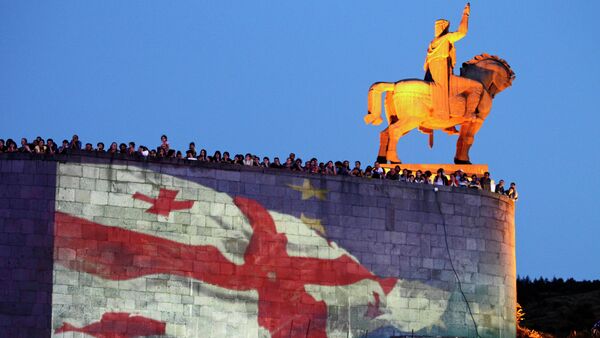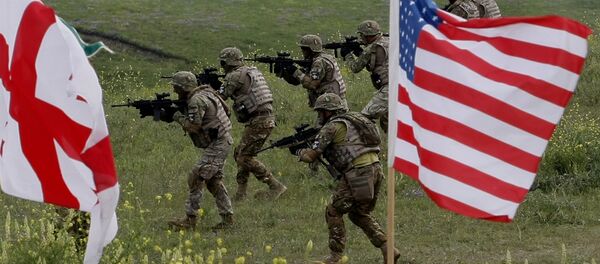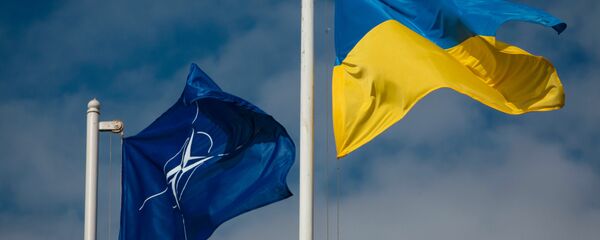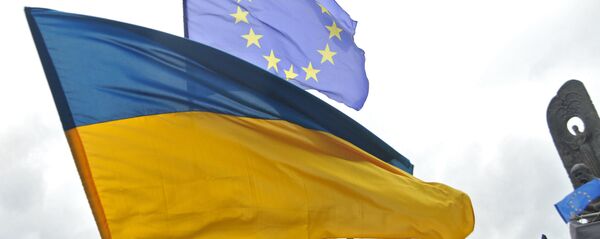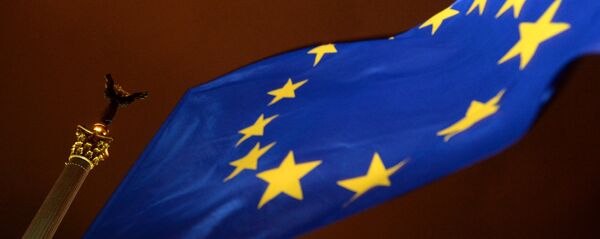At the recent NATO summit in Warsaw earlier this month, Tbilisi was patted on the back for its ongoing military and economic reforms, while issues including the country's membership in the alliance, and visa-free entry into the EU, were shelved for future discussion. This, according to the broadcaster, has shaken Georgians' faith in the prospects and sensibility of joining the Western institutions.
Speaking to PAP journalist and political analyst Wojciech Jagielski, Teimuraz Papaskiri, a professor of history at Tbilisi State University, suggested that Georgia's behavior at the recent NATO summit showed that they have almost become resigned to a fate of perpetual limbo.
Georgia, TVN24 recalled, had first declared its wish to join the North Atlantic Alliance in the 1990s, during the reign of former Soviet Foreign Minister Eduard Shevardnadze. In 2008, an advisory referendum staged by former President Mikheil Saakashvili found that over three-quarters of the population supported NATO membership. Western officials promised the Caucasian nation eventual membership at the alliance's 2008 Bucharest summit.
However, the broadcaster pointed out, following a failed attempt by Tbilisi to crush restless regions of South Ossetia and Abkhazia in August 2008, "the West, while continuing to support Georgia's efforts to get closer to Europe, began to evade its formal obligations to Tbilisi, fearing the escalation of a conflict with Russia."
At the alliance's summits in Chicago in 2012 and Newport in 2014, Georgia was not granted an official list of conditions for membership. "The Georgians did not receive such a list in Warsaw either," TVN24 noted. "After praise for reforms in the military and the progress of democracy, officials returned to Tbilisi with promises only of greater military assistance and reassuring parting words that there will come a day when Georgia is admitted into NATO."
Speaking to the broadcaster, Wojciech Gorecki, a former diplomat and Caucasus expert at the Warsaw Center for Eastern Studies, emphasized that he did not believe that Georgia had any hopes of joining the North Atlantic Alliance in the coming years. "NATO, and especially Germany and France, are opposed to the alliance being pulled into another troubled region, with the Caucasus seen as such a region," he explained.
"Of course, if it came to an escalation of the confrontation between the West and Russia, NATO, looking for every possible ally, would invite the Georgians into the alliance; but for now they are being made to understand that they should be satisfied with strengthened military cooperation, joint exercises, political support and praise for their fulfillment of the objectives and conditions which the West has set for them," Gorecki added.
For his part, Professor Papaskiri suggested that "it would be foolish to expect anything more. We in Georgia know that whether and when we are accepted into NATO depends not on our readiness to do so, but on the political situation in the world, and it is not currently favorable for us."
"Once again we were praised, and once again told to be patient…However, I for one cannot imagine that four years later, following another NATO summit, we will also return home empty-handed," the professor added. Georgians' patience and the desire to move toward European and North Atlantic institutions are not without their limits, Papaskiri warned.
"Georgia's goal is to join the West, and this is the direction we want to go, but if we do not get anything in return, a sense of frustration and doubt will emerge over the efforts and sacrifices we have made in exchange for praise and promises," the analyst noted. "Such a state of affairs is already having an impact on the internal political situation in Georgia, and will affect it even more in the future," he added.
The country's reevaluation of its geopolitical priorities has already begun, TVN24 suggested. "Only a few years ago, if some party in Georgia explicitly called for an alliance with Russia, it would be tantamount to political suicide." Today, Gorecki added, "calls for the need to build relations with Russia above and beyond integration with the West are no longer considered heresy."
The issue was recently postponed until the fall, and experts have already indicated that there are no guarantees that it will be decided in Tbilisi's favor, with German officials specifically voicing concerns over Georgian organized criminal groups operating in Europe.
As a result, Gorecki noted, ordinary Georgians are growing increasingly irritated and discouraged regarding the government's pro-Western orientation. The situation, the analyst added, is making it easier for pro-Russian parties such as the Alliance of Patriots and the Democratic Movement-United Georgia to convince Georgians "that the West is not so much as lifting a finger in relation to Georgia, and therefore the country should take care to ensure good-neighborly relations with Russia."
According to TVN24, Georgia's pro-Russian electorate presently represents about one fifth of all voters, and that figure is only set to grow. Meanwhile, institutions such as the Russian Orthodox Church-affiliated Georgian Orthodox Church, along with a strong diaspora community and economic ties with Moscow (including workers' remittances) helped to prevent a complete disintegration in pro-Russian attitudes even during Saakashvili's tenure, and will be sure to play a role in further improving ties as time goes on.
In October 2016, Georgia will go to the polls for parliamentary elections, and only time will tell whether more pats on the back and patronizing attaboys from Brussels, Berlin and Washington will be enough to convince the Caucasian nation to continue its pro-Western course.

